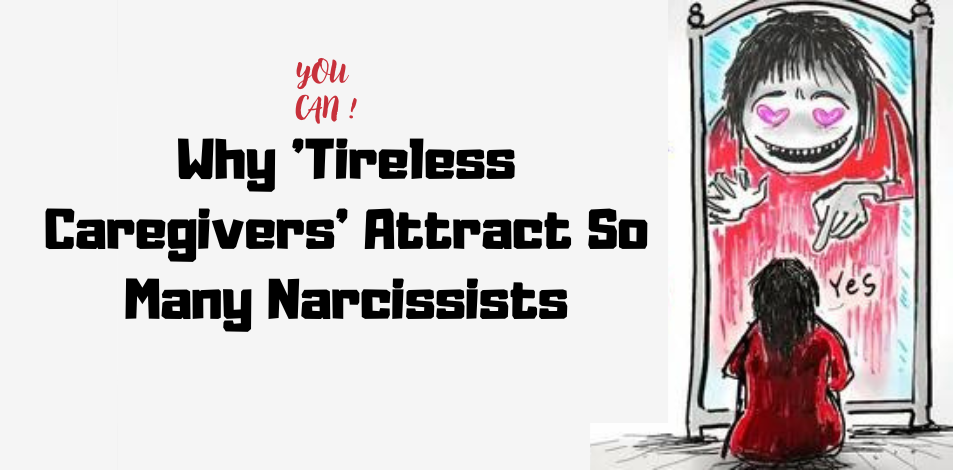
In a recent post, I wrote about what I refer to as “diligent caregivers.” Diligent caregivers are compassionate, good listeners, drawn to caring for others, and place a high value on relationships. The problem with diligent caregivers isn’t that they care, it’s that they feel compelled to care for everyone and everything, ultimately to their own detriment. The “diligent” part refers to their behaviors and motivations, not the sense of giving, giving, giving while getting little in return. In any case, taking care of everyone at your own expense is exhausting, frustrating, and unnecessary.
Diligent caregivers are typically thought of as women, but men can be diligent caregivers as well. These individuals will find themselves, time and again, in unbalanced relationships, whether they be friendships, dating relationships, relationships at work, or with family members.
Why Diligent Caregivers Are Attracted to and Stick With Narcissists and Selfish People
Diligent caregivers tend to place a high value on relationships and seeing the good in others.
They often invest heavily in people—even those who are self-centered—because they believe that the 1, 2, or 5% of a person who seems really great is the “real” person.
Likewise, diligent caregivers believe that if they are patient and nurturing enough, that tiny percentage will grow to balance out or change the other 95% of the selfish person (who doesn’t actually want to change).
It’s human nature to view other people’s motivations, emotions, and intentions through a personal lens: Diligent caregivers assume that others should share a similar code of behavior. As a result, they often don’t see selfish people’s motivations through a nuanced lens.
It is difficult for diligent caregivers to accept that they cannot “cure” another person’s narcissism simply by loving and caring, being more accepting of others, being patient enough, etc. Diligent caregivers who fear that saying “no” means they are “selfish” or “bad” often remain in one-sided relationships.
In addition to the above, narcissists are often very attractive. They may be adept at making people feel special when they focus their attention on them.
Conscientious caregivers have difficulty setting boundaries, feel guilty when they don’t provide care and are particularly sensitive when they are perceived as selfish, unkind, or unloving. Showing kindness and care for others is essential to their identity and sense of self-worth. As such, narcissists are highly desirable, as both partners will eventually agree that the narcissist’s needs are the most important in the relationship.
In my research, I have found that many conscientious caregivers admit that they wouldn’t know who they are if they weren’t in the role of the person everyone turns to.
How Narcissists Provide “Job Security” for Conscientious Caregivers
The downside to this combination of strengths and weaknesses is that it makes conscientious caregivers vulnerable to attracting selfish people. So why do narcissists so often choose to be with, and stay with, selfish people rather than find partners and friends who are as caring and compassionate as the narcissists themselves?
Being with someone who needs a steady stream of validation, attention, and care provides the diligent caregiver with a kind of “job security”: it ensures that the narcissist will continue to be needed, and thus have a meaningful role.
Selfish people set the stage for caregivers to continue doing the things they do well.
Selfish people are uncanny at knowing how to shift blame and responsibility to the guilt-prone, easily-responsible narcissists.
When someone is the obvious “bad guy”—selfish, untrustworthy, unfaithful, etc.—this allows the diligent caregiver to remain the “good guy” by comparison.
Familiar relationship patterns are like old grooves in the road—it takes a lot of energy—at least for a while—to create a new path.
Because people who are constantly focused on themselves are not motivated to change (and no one can change someone who doesn’t want to), the most important thing a self-centered person can do is work on themselves.
How to Start Working on Yourself
The most important thing is to know yourself. Know how you think about yourself: Why are you here? How do you know if you’re a “good person?” What types of relationships do you tend to attract? When you think about the way you are in relationships, does it remind you of anyone else in your life, like a parent or significant other? Keep a journal. Start noticing what you notice.
Ask yourself, “What does the healthiest, most compassionate version of myself want from me?”
Understand the difference between compassionate care and toxic care—care that leaves you frustrated, exhausted, resentful, or worse.
Practice mindfulness. Mindfulness meditation can help you overcome the discomfort that comes when you start to change old patterns, say no to unreasonable requests, and set boundaries with people who have always agreed to your approval.
Consider guided imagery or self-hypnosis. These techniques can help you mentally rehearse making the necessary changes, reduce your anxiety about doing so, and boost your self-esteem. All change starts in the mind. Seek professional help if necessary. Changing ingrained relationship habits takes time. Working with a professional can help you get past the rough spots and emerge better, stronger, and ready to form healthier relationships.




